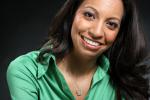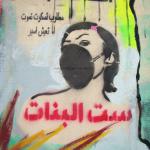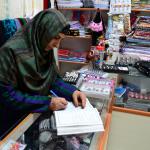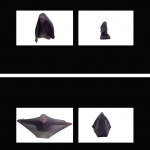Editor Maria Ebrahimji of the "I Speak for Myself" anthology talked with Muslima Curator Samina Ali about representing Muslim women in the mainstream media, the beauty of self-expression, and how Muslim women can take charge of their own identities.
Samina Ali: You’re a religious Muslim woman who doesn’t veil and works in the media. I’ve read that at an international Muslim woman’s conference in New York a few years ago, some the international Muslim women were perplexed by you. Explain why you think that is.
Maria Ebrahimji: Just as there are some Americans who don’t understand or know much about Islam, there are also assumptions that exist within the Muslim community about how American Muslims practice and live out their faith. This is by no means a criticism- I think that everyone has a frame of reference and that assumptions are natural. The beauty for me is to be able to change or realign these assumptions and give people an alternative model or frame of reference to think about. At this conference, I came across several women who were just simply surprised to see a Muslim American woman working in the media and in such a high profile, public-facing role. Since that encounter, I have seen the amount of Muslim women increase in fields like journalism, media, and communications. It is so nice to (finally) be in a lot of familiar company – in a field where early in my career, I felt mostly alone.
Did this experience inspire you to compile the anthology, I Speak for Myself?
In some way, yes it did inspire me. I have always felt, however, that my profession has afforded me an incredible gift and responsibility to not just seek the truth, but to also give voice to those people and stories worth sharing. The book came about because I simply felt there were a lot of women just like me: born and raised in the US, Muslim and American, who have been navigating this identity (or in some cases identities) our whole lives. Why not allow others to hear our stories and see the diversity that I see every day in my community?
What was your hope in putting together the anthology? And, looking back now after some years since its publication, in what ways do you think you achieved what you were hoping?
We really wanted the anthology to be a talking point among young American Muslim women, especially young girls. Growing up, our generation never had access to such writing or platforms, but this book is a way to pay it forward to those coming behind us. It gives young girls not only a frame of reference but also some solace in knowing that their experiences and frustrations were shared and lived through by others. It is also an affirmation that we have “arrived,” that we have a voice that cannot be extinguished.
And personally, this book represents a real achievement in that it was a gathering of 40 unique, spirited, and wholly American voices - something I would never have been able to accomplish on television in a meaningful way. Perhaps most importantly, it has created a bond of 40 women that continues to this day, whether virtually or through sidebar initiatives.
Muslim women seem to have a two-fold issue: they face scrutiny about their appearance from those who aren’t Muslim but they also are scrutinized by fellow Muslims. In speaking to so many different Muslim women around the world for your anthology as well as your work at CNN, what have you learned about women in this crossfire and how best to handle it?
I find it so unfortunate that such scrutiny and judgment exists in the Muslim community. What are we teaching young girls about self-esteem and how to be responsible and God-fearing adults when we ourselves continue to cast judgment on each other? I find it especially troublesome when judgments are cast among women. To me, being a good Muslim means working towards the betterment – not the belittlement – of others.
You’re currently the Director and Executive Editorial Producer for Network Booking at CNN. Can you explain what you do?
I really feel like I have one of the most amazing jobs out there. My role entails working with a team of very talented producers across all CNN platforms, who work to bring newsmakers on air. It is a very outward facing job, which enables me to regularly interact with academics, politicians, analysts, and every day people impacted by the stories we cover. We find new voices to introduce to our audiences, work on special projects, and go in the field on breaking news stories. It’s been almost fifteen years since I started here, and I can’t say that it has ever been a “dull” news day!
Western media is one of the main culprits of spreading stereotypes about Muslims and Muslim women. How do you address this critical issue in your role at CNN?
First and foremost I address it by simply existing here. I truly believe that the diversity of storytelling and the way in which we bring context and depth to stories is all dependent on the people who work in our newsrooms. At CNN, I am Vice Chair of the Diversity Council, where I help to manage and influence our editorial decision-making as well as internal inclusion efforts. Because I am a Muslim and my colleagues know (and appreciate) that, I can easily influence and help shape our storytelling to ensure that it doesn’t play into stereotypes but instead accurately reflects the issue at hand- and represents all points of view. Just because I am a Muslim doesn’t mean I can’t be a good journalist either. I know I have a real responsibility to ensure we are telling stories in a fair way and I always put that first.
Outside of my work at CNN, I also value the role I can play in helping others understand the need for diversity and dialogue in our communities when it comes to talking about faith issues. I recently participated in a working panel of media professionals which helped craft a white paper for the Aspen Institute’s Inclusive America Project. The report (entitled “Principled Pluralism”) focused on ensuring religious diversity is promoted and actively discussed in all aspects of community life – whether in government, youth, religious, or media sectors. Engagement from both sides is key to dispelling stereotypes regarding any religious community.
I want to go back to I Speak for Myself. The essay you wrote spoke honestly about the dilemma of being unmarried in a community that expects women to marry and have children. Can you briefly describe your experience for those who haven’t read the essay?
Many years ago, I was made to feel like I had to compromise my career ambitions in order to find a good life partner. Someone proposed that my career was preventing me from being wholly Muslim or furthermore being wholly complete in life (ie, married). Their assumption was based on another assumption- that my work was taking me away from my faith when, in fact, I think I felt more driven towards it.
In retrospect, the biggest mistake I made was letting that person’s words swim around in my head for way longer than they should have. I have every intention of finding a life partner and having a family and a career (and yes, all three at once- just as it’s possible to be Muslim and American!)
The anthology has now become a series. What was the purpose behind this?
Very early on in the publicity effort for I Speak for Myself: American Women on Being Muslim, my co-editor, Zahra Suratwala and I realized the potential platform we could build around the idea of self-narratives. We weren’t yet finished promoting the women’s book when we were already getting inquiries about a men’s volume! So we launched I Speak for Myself, Inc. a book series that aims to deliver one core product, a "narrative collection" that is mindset-altering, inspiring, relatable, and teachable. We focus on interfaith and intercultural titles, and have partnered with White Cloud Press to publish the books. The first two books focused on American Muslims, while the third book featured essays from young Arab men and women. I am excited to announce that Talking Taboo, Volume 4 in the series and a collection of essays by Christian American women, will publish this October.
Around the anniversary of 9/11, people will be thinking about this tragedy again. The recent Boston bombings has fueled the fear and misunderstandings people have about Islam. As someone who works in the media, what is the one 20-second message you’d like to send out during this time?
Understanding can only come with interaction. While we cannot speak for others, we can certainly speak for ourselves and share our own stories of faith. The more stories people bear witness to, the deeper their knowledge of the ‘unknown.'
- Log in to post comments




